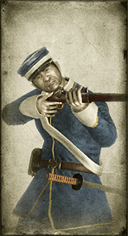
Basic Unit Statistics (can be modified by difficulty level, arts, skills, traits and retainers)
| Recruitment Cost | 1030 | |
| Upkeep Cost | 130 | |
| Melee Attack | 10 | 28% |
| Charge Bonus | 15 | 30% |
| Bonus vs Cavalry | 7 | 23% |
| Range | 125 | 19% |
| Accuracy | 55 | 55% |
| Reloading Skill | 40 | 40% |
| Ammunition | 10 | 12% |
| Melee Defence | 5 | 14% |
| Armour | 2 | 13% |
| Morale | 10 | 20% |
Strengths & Weaknesses
- Good accuracy and reload rate.
- Average in melee.
- Weak against cavalry.
- Presence encourages nearby friendly units.
- Very good morale.
Abilities
- Kneel Fire - The first rank of this unit will kneel to allow the first two ranks to fire simultaneously.
- Suppression Fire - This ability increases reload rate but lowers accuracy. Enemy units hit by suppression fire are slowed and suffer a morale penalty.
Requires
Description
The Kihetai are line infantry, and deadly with their modern rifles.
These men have been trained to deliver disciplined volleys of gunfire into enemy formations. They are well drilled, and can maintain a good rate of fire and be fairly accurate too. Their weapons are capable of inflicting horrible wounds, like most modern large-bore rifles. The Kihetai have a robust sense of morale, but their resilience is not bottomless. They are not particularly competent in close combat, and will suffer if they are overrun by a cavalry attack. The Meiji Restoration saw the foundation of a modern army and navy for Japan. Many of the senior officers in the Imperial Japanese Army were natives of Choshu, and this lead to tensions with the Imperial Japanese Navy, where men from Satsuma occupied the top jobs. The two domains had a long traditional enmity, and this continued as a not-so-covert struggle for dominance in Japanese affairs between the Army and the Navy. Favouritism in both services made sure that men of Choshu and Satsuma were usually favoured for promotion in the services, further entrenching the rivalry. This was to have profound consequences for Japanese politics, diplomacy, and even the course of the Second World War. Well before then, however, the situation became so bad that Army officers from regions other than Choshu actually formed a secret society, the Double Leaf Society, to root out "corrupt" officers. Their fanaticism, and the fanaticism of other secret groups, also spilled out into wider politics.